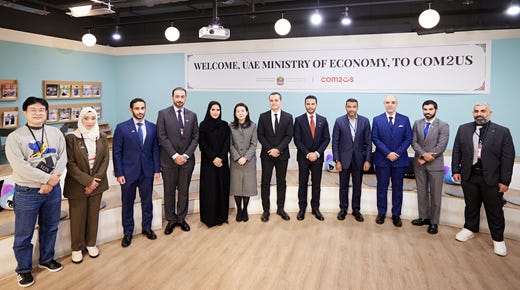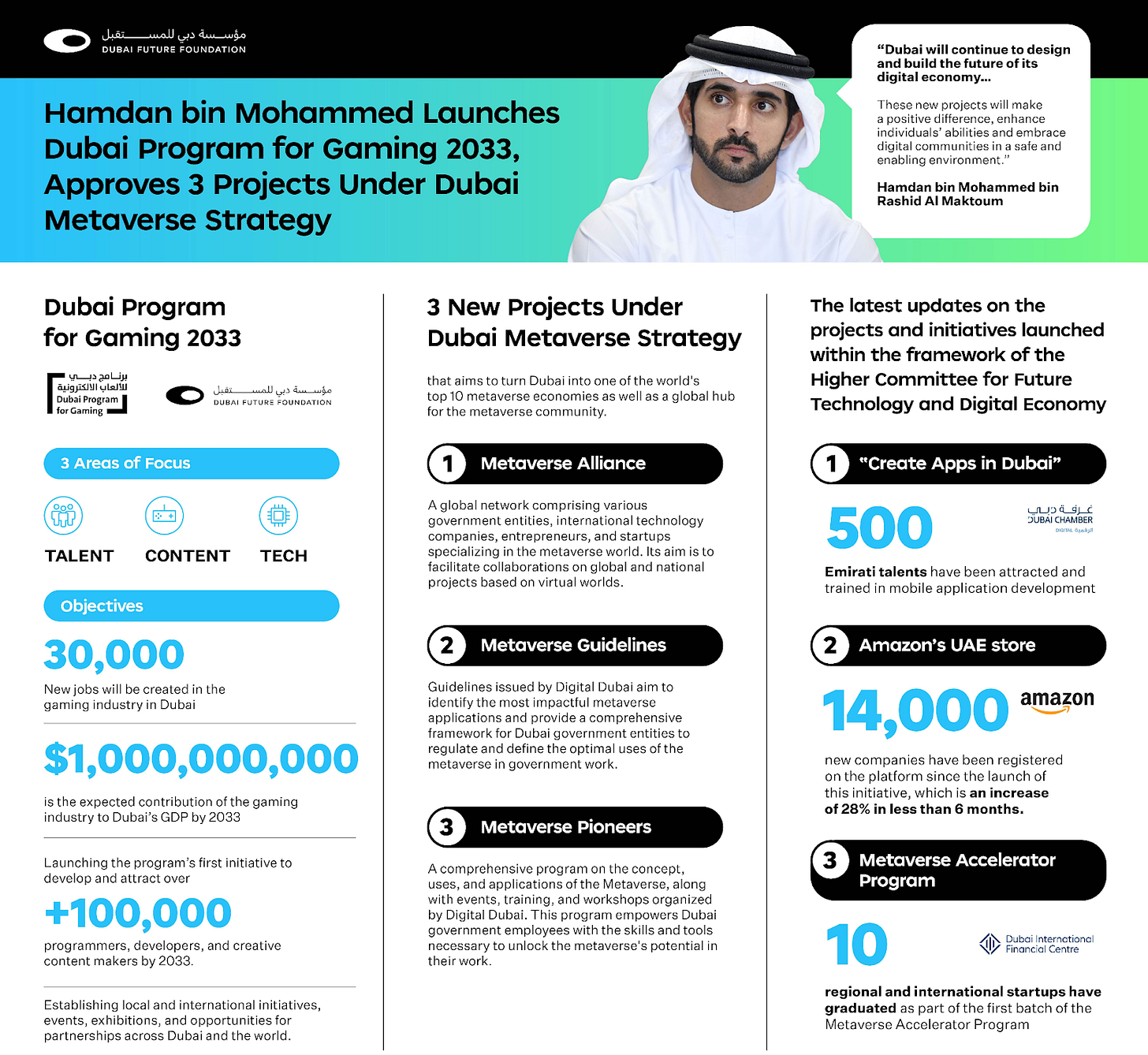
Can Dubai Make Web3 Games Great Again?
How the UAE and Dubai Are Shaping the Future of Web3 Gaming
This report is written by Tiger Research, exploring the potential opportunities in Dubai's Web3 gaming ecosystem as the world's leading Web3 gaming destination positions itself as a global gaming hub.
TL;DR
The UAE is actively fostering the Web3 gaming industry as part of its economic diversification strategy to reduce reliance on oil. The nation’s gaming market is valued at $420 million, with a strong foundation as 90% of the adult population engages in gaming.
Dubai’s “Dubai Program for Gaming 2033” aims to contribute $4 billion to GDP and create 27,000 jobs by 2030. The program focuses on developing a gaming ecosystem that integrates virtual reality (VR), artificial intelligence (AI), and Web3 technologies.
The Dubai Multi Commodities Centre (DMCC) serves as a key hub for the Web3 gaming ecosystem, hosting over 100 gaming companies. Through seamless collaboration between its gaming and cryptocurrency divisions, DMCC supports businesses with funding, incubation, and talent acquisition, accelerating innovation in the sector.
1. UAE’s Gaming Industry Strategy: Expanding with Dubai at the Core
The United Arab Emirates is making significant strides in the gaming industry. Leveraging its geographic advantage as a bridge between Europe and Asia, alongside robust digital infrastructure like 5G networks and data centers, as well as business-friendly policies such as tax incentives and regulatory sandboxes, the UAE has emerged as a leading innovation hub in the Middle East. Now, it is positioning the gaming industry at the heart of its next phase of growth.
In 2023, the UAE gaming market exceeded $420 million, growing at a robust annual rate of 8.94%. 90% of the adult population engages in gaming, with 23% spending over 11 hours per week, underscoring the industry’s role as a key economic and cultural driver in the UAE.
Building on its strong gaming industry foundation, the UAE aims to lead the emerging Web3 market. It has outlined an ambitious vision to drive the global blockchain gaming sector, focusing on nurturing local talent, supporting startups, and attracting global companies seeking a stable and innovative ecosystem.
This report provides an in-depth analysis of the UAE’s strategy for fostering the Web3 gaming industry, with a focus on the strategic framework centered around Dubai. It examines potential opportunities to offer a comprehensive understanding of this evolving sector.
2. Web3 Gaming in the UAE: A Strategic Choice for Economic Diversification
The UAE is diversifying its economy to reduce its dependence on oil and gas. According to the Federal Statistics Center, the oil and gas sector's GDP contribution fell from 28.4% in 2019 to 27.6% in 2022. While this demonstrates progress in economic diversification, the oil industry remains central to the nation’s economy.
The country faces structural limitations, including a small domestic market and heavy reliance on re-exports and oil revenues. To address its economic vulnerability to global oil price fluctuations, the UAE is focusing on fostering digital industries. The gaming sector stands out as a high-potential area, combining cultural relevance and economic opportunity. With high user engagement and rapid growth, gaming is becoming a pivotal driver of digital transformation.
The UAE is pursuing differentiated approaches within the gaming industry. Currently, the global market is dominated by the U.S. and China. To gain competitiveness, The UAE is laying a foundation for long-term growth by actively collaborating with leading Korean gaming companies such as NCSoft and Com2us. These partnerships provide a fast track to establishing a robust gaming ecosystem by leveraging the expertise and resources of established industry leaders.
This strategy enables the UAE to build a competitive base in traditional gaming markets. However, competition within these existing frameworks limits the potential for clear differentiation. Recognizing this, the UAE is likely crafting strategies that go beyond traditional gaming and aim for unique positioning in emerging segments like Web3 gaming, where innovation and blockchain integration can provide a decisive edge.
3. Dubai’s Strategy for Web3 Gaming Industry Growth
Among the UAE’s emirates, Dubai’s proactive approach to economic diversification is particularly notable. Unlike other emirates, Dubai faces a relatively more urgent challenge of finding new growth drivers due to its depleted natural resources. Reflecting this need, Dubai’s GDP already shows a higher reliance on non-oil sectors such as trade, tourism, and logistics compared to Abu Dhabi.
As part of its diversification strategy, Dubai has identified blockchain and virtual assets as next-generation growth engines. With the ambitious goal of becoming one of the world’s top 10 metaverse economies, Dubai plans to attract over 1,000 blockchain and metaverse companies. This vision has already led to significant results. Global firms like Binance, FTX, and Crypto.com have established regional headquarters in Dubai, driven by the emirate’s supportive policies and infrastructure.
Dubai has identified gaming as a key part of its digital transformation strategy. Initiatives like the Dubai Program for Gaming 2033 and the DMCC Gaming Centre aim to establish the emirate as a global hub for leading gaming companies, supporting its vision of a tech-driven economy.
3.1. Dubai’s Long-Term Strategy for Web3 Gaming Industry Growth
On May 7, 2024, His Highness Sheikh Hamdan bin Mohammed bin Rashid Al Maktoum, the Crown Prince of Dubai, officially launched the “Dubai Program for Gaming 2033” (DPG33). This initiative aims to accelerate the UAE's digital economic transformation by fostering growth in gaming, virtual reality (VR), artificial intelligence (AI), and Web3 technologies.
Dubai has set ambitious goals for DPG33, targeting a $4 billion contribution to GDP and the creation of 27,000 jobs by 2030. In the short term, the program aims to train 100,000 programmers, developers, and creators by 2025, laying a solid foundation of talent to drive $1 billion in GDP within the gaming sector.
To achieve these goals, DPG33 focuses on three core projects integrating VR, AI, and Web3 technologies:
Metaverse Alliance: A collaboration network involving government bodies, international corporations, and tech companies to build strong global partnerships.
Metaverse Guidelines: A comprehensive technical framework for developers to streamline innovation within the metaverse ecosystem.
Metaverse Pioneer Program: Support for groundbreaking projects that merge cutting-edge technologies to establish a next-generation gaming ecosystem.
Dubai’s approach combines talent development, robust technical frameworks, and support for innovation to secure leadership in the future gaming market. By integrating VR, AI, and Web3 technologies, Dubai seeks to redefine the gaming industry paradigm and position itself as a global hub for next-generation digital innovation.
3.2. DMCC: A Key Driver of Dubai’s Web3 Gaming Ecosystem
The Dubai Multi Commodities Centre (DMCC) has established itself as a pivotal force driving Dubai’s Web3 gaming ecosystem. Its unique structure, combining a gaming hub and a cryptocurrency division within a single Free Zone, facilitates seamless collaboration across sectors.
Recently, DMCC expanded its services by launching a metaverse platform. This virtual hub offers compliance and banking service clinics while streamlining processes for establishing cryptocurrency ventures, providing blockchain entrepreneurs with a one-stop solution. This approach is expected to enhance cross-sector collaboration beyond Dubai’s Web3 landscape.
Currently, over 100 gaming companies operate within DMCC. These firms benefit from resources such as funding support, business incubation, and access to top-tier talent. From startups to established enterprises, companies are leveraging DMCC’s ecosystem to explore new opportunities and efficiently integrate expertise and resources within the blockchain domain.
DMCC’s holistic approach acts as a catalyst for advancing the Web3 gaming industry. By fostering collaboration and innovation among its participants, DMCC is positioning Dubai as a global hub for Web3 gaming, paving the way for future growth and leadership in the sector.
4. The Future of the Web3 Gaming Industry in the UAE and Dubai
In the UAE’s Web3 market, Abu Dhabi and Dubai are competing for leadership. While Abu Dhabi fosters the gaming industry through its AD Gaming initiative, it has yet to develop concrete policies specifically for Web3 gaming. In contrast, Dubai is taking an active approach with its “Dubai Program for Gaming 2033” and robust support frameworks like those provided by DMCC. The region's abundant capital and progressive regulatory environment are expected to create significant growth opportunities for Web3 gaming startups.
Currently, the Web3 gaming market is grappling with the “Negative Halo Effect”, where the underperformance of early projects has led to a cycle of diminished attention for new Web3 games. In this context, Dubai’s long-term, structured support policies are anticipated to provide a stable foundation for Web3 gaming companies to thrive.
A particularly promising area for synergy is the emerging field of AI agent technologies. AI can enable intelligent NPC behavior, automate game testing, and deliver personalized gaming experiences. Dubai’s innovative regulatory environment and access to substantial capital make it an attractive hub for AI-powered Web3 gaming projects, as well as standalone AI agent initiatives.
By combining strategic policies with cutting-edge technology, Dubai is well-positioned to drive the growth of the Web3 gaming industry and solidify its status as a global leader in this evolving sector.
🐯 More from Tiger Research
Read more reports related to this research.Disclaimer
This report has been prepared based on materials believed to be reliable. However, we do not expressly or impliedly warrant the accuracy, completeness, and suitability of the information. We disclaim any liability for any losses arising from the use of this report or its contents. The conclusions and recommendations in this report are based on information available at the time of preparation and are subject to change without notice. All projects, estimates, forecasts, objectives, opinions, and views expressed in this report are subject to change without notice and may differ from or be contrary to the opinions of others or other organizations.
This document is for informational purposes only and should not be considered legal, business, investment, or tax advice. Any references to securities or digital assets are for illustrative purposes only and do not constitute an investment recommendation or an offer to provide investment advisory services. This material is not directed at investors or potential investors.
Terms of Usage
Tiger Research allows the fair use of its reports. ‘Fair use’ is a principle that broadly permits the use of specific content for public interest purposes, as long as it doesn't harm the commercial value of the material. If the use aligns with the purpose of fair use, the reports can be utilized without prior permission. However, when citing Tiger Research's reports, it is mandatory to 1) clearly state 'Tiger Research' as the source, 2) include the Tiger Research logo(Black/White). If the material is to be restructured and published, separate negotiations are required. Unauthorized use of the reports may result in legal action.








